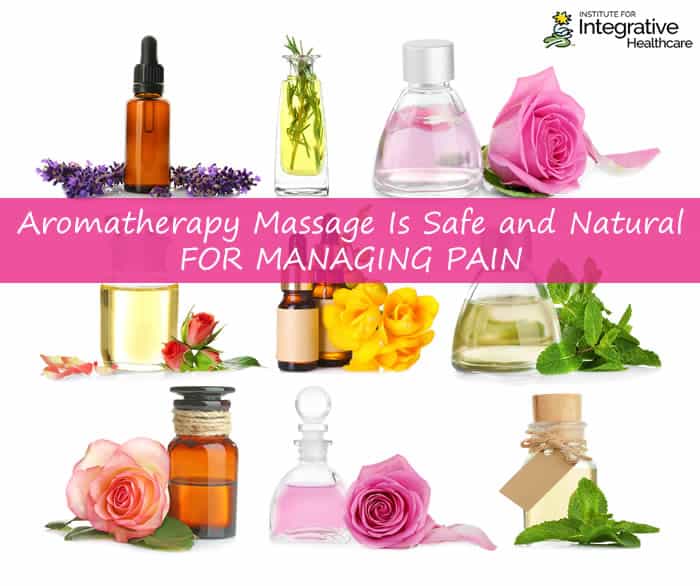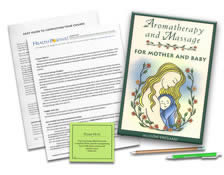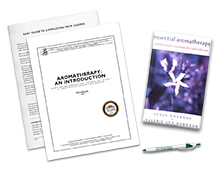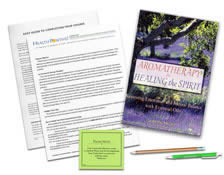

Aromatherapy is the use of plant essences (aka essential oils) for therapeutic purposes. Essential oils may either be inhaled or applied to the skin to:
- help support the immune system
- provide stress relief
- offer relaxation
- enhance sleep
- ease muscle tension and pain
- and support emotional balance.
Aromatherapy massage is a safe, natural approach for effectively managing pain. When we experience pain, whether it is from an occasional headache or chronic health condition, the discomfort may feel stressful, overwhelming, and exhausting. Massage therapy clients are often looking for help with some aspect of pain.
The combination of specific massage techniques, along with particular essential oils with analgesic and anti-inflammatory properties, help to lessen pain, supporting the body’s ability to rest and heal. According to a study completed in 2016 (Lakhan, Shaheen et al.), found that aromatherapy massage is successful at manually controlling symptoms of pain in a variety of health conditions.
Types of Pain
In order to determine the best pain-relieving essential oil for aromatherapy massage, it is helpful to know what type of pain someone is experiencing.
Muscular Pain
Muscular pain is common for athletes and very active, hardworking individuals. Their pain may arise from a sports injury, after repetitive or overuse of a particular muscle group or tendon, or trauma from an external force causing injury to the muscle. Or, sometimes muscular pain can arise from stress on the body in one way or another.
Muscular pain may present as:
- cramping
- soreness
- spasm
- or a bruised feeling.
Massage therapy, with the help of essential oils, can successfully bring circulation to the muscle or area of discomfort, support cellular repair, help decrease spasms, relieve menstrual cramps, and soothe bruising.
Nerve Pain
Nerve pain is typically more intense than muscular pain. Nerve pain occurs when there is an irritation or impingement due to an infection, obstruction, or some type of pressure on a sensory nerve. Aromatherapy massage can help to calm the emotions of a person who is experiencing nerve pain.
Specific essential oils applied to an area of the body with nerve pain can lessen inflammation and discomfort in the area, relax the surrounding tissues, and therefore ease their overall experience of pain. If the client experiences less pain, they can relax. If they can relax, they will have less pain.
Chronic Pain
Chronic pain refers to pain that stays with a person for an extended period of time and therefore needs ongoing support. Some examples of chronic pain conditions are back pain, arthritis, cancer and fibromyalgia.
People living with chronic pain often experience lack of sleep, restlessness, and irritability from dealing with the ongoing pain. For chronic conditions, aromatherapy massage may be used as an ongoing source of support as a client navigates the world in constant pain.
The Best Essential Oils for Pain Relief
When working with someone experiencing pain, it is important to address the needs of the whole self – mind and body. Aromatherapy is an effective modality for treating pain because it supports the whole person in the process of living with and coping with pain.
Once you know the type of pain you are dealing with, you can choose a pain-relieving oil and massage approach. It is important to always dilute the essential oil in a carrier oil or cream base before applying to the skin.
For acute muscular, or nerve pain, dilute the essential oil to 3% to use for therapeutic massage. This dilution means that you will add 15-18 drops of essential oil into 1 oz. of carrier oil.
Muscular Pain
There are many wonderful oils for muscular pain.
Some of the best essential oils for this type of pain are:
- lemongrass
- spike lavender
- lavender
- eucalyptus (globulous or radiata)
- and peppermint.
If a client presents with a tension headache caused by tightness in the neck muscles, lemongrass, spike lavender, lavender or peppermint are good choices. These oils all have analgesic and antispasmodic qualities.
Create a massage oil with one or more of these oils and apply directly to muscles of the neck, especially the sub occipital muscles which tend to hold a lot of tension. Hold the client’s head and allow your fingers to sink into the back of the skull. Hold this position for several minutes.
Headaches
For headaches that move into the jaw and top of the head, apply pressure on the acupressure points for the gallbladder meridian on the head, beginning at the outer corner of the eye. Use your fingertips to slowly massage the temples and scalp in a circular motion.
If a client is experiencing a migraine headache and can’t tolerate touch to the head – foot massage, especially to the big toe – can be an effective approach. Focus on applying good pressure to the various points at the top and around the sides of the toe. This approach can help to draw energy down and away from the head.
Sports Injuries
For post-sports injuries and muscle spasm, peppermint or rosemary essential oil make wonderful aromatherapy for massage. Both of these oils help to increase circulation, aid in muscle repair, and decrease pain sensations. For instance, for calf spasms, apply peppermint massage cream to your palms and press firmly on the muscle belly. Hold pressure until the spasm dissipates. Finish with brisk effleurage and gentle stretching of the muscle.
Abdominal Pain
For abdominal pain and menstrual cramps, aromatherapy massage can be soothing.
Blend cardamom or ginger essential oil in a carrier oil. These two oils are especially warming and bring circulation to the area. Roman chamomile and lavender are milder, very calming oils that may also be effective. Apply to the skin in a slow, rhythmic, clockwise motion.
If the client tolerates, small petrissage massage can be used to aid in digestion as well. These two oils are very warming and almost instantly ease pain.
Sciatica
Sciatica is a common nerve pain that benefits from aromatherapy massage.
Frankincense, ginger, or helichrysum all have anti-inflammatory properties and may help to ease pressure from surrounding tissues on a nerve. Apply acupressure massage to points along the sacrum and gallbladder points (ie. GB 29). Hold the points several times with good pressure. Effleurage the hips and hamstrings to bring circulation to the area.
Chronic Pain
For chronic pain, many types of aromatherapy will be helpful. However, it is best to discuss with your client their scent preferences before beginning massage.
For instance, a person living with cancer may be very sensitive to smells. You want to choose something that will be relaxing and ultimately will relieve some of their pain. Lavender is generally well tolerated by most people. Swedish massage with lavender essential oil may be applied to the area of pain, or the full body, if needed.
Ginger essential oil is another one to consider. Dilute to 2% (10-12 drops to 1 oz. carrier oil) for chronic conditions.
When working with clients with chronic pain, or any pain in fact, be sure to check in with them frequently about how they are feeling during the session, so you may adjust the aromatherapy, pressure, massage modality etc. to make them feel the most comfortable.
4 Safety Considerations
- Always dilute essential oils in a carrier oil or cream before applying to the skin.
- If an oil has been exposed to sunlight or past its shelf life, do not use it on the skin.
- Never apply oils for pain on cuts, scrapes, or open wounds.
- For the elderly and young children, some of the above mentioned oils may be too strong and will irritate their skin. Consider using gentler aromatherapy options such a lavender, lemon, and geranium. Dilute the essential oils to 1%, which would be 5-6 drops (or 1 oz.) of carrier oil.















